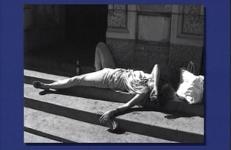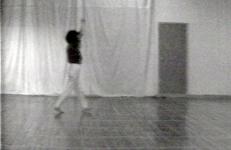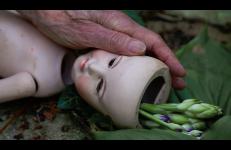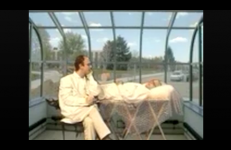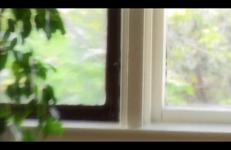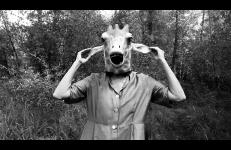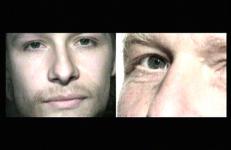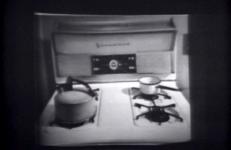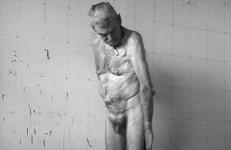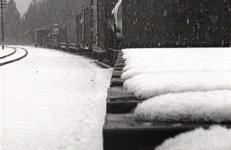Inventing freedom as they roam, videomaker Ellen Spiro and her dog Sam go west in a vintage Airstream trailer in search of elderly dropouts and their dogs who have pulled out of society and into by-the-side-of-the-road trailer communities. Our mutt narrator tells his tale, sharing his thoughts on America’s smells, the foibles of humans, and his view of aging as another journey. In unplanned meetings with gray nomads, psychic misfits, and free spirits, Roam Sweet Home takes the myths of growing older and turns them on their head.
Aging
This tape functions on two levels. Montano addresses menopause and acts out her worst nightmares around that issue—playing the out-of-control, alcoholic crone. By doing this publicly on tape, she felt that she could look at, share and make friends with, her concerns with aging. The experience of viewing this video moves from an autobiographical look at Montano’s process to an interactive game for the viewer.
Shifting Positions is a semi-autobiographical/fictional trilogy exploring becoming queer later in life, my father's dementia, and our mid- and end-of-life crises. The selling of our family home of forty years prompted the making of the first section, entitled 'Last Home', which investigates the ways memories and spirits inhabit a house. In the remaining two sections— 'Napping' and 'Behavior Of Fascination'—the relationship between father and daugther is looked at through 'home movies' and documented intimate moments of private life. —Kathy High
Adopting the movements of various animals, Forti begins the performance by walking hypnotically in circles. She falls to the floor and begins a cycle of walking and crawling that becomes an open metaphor for evolution and aging. Through the course of the performance, the camera follows Forti's circling motion at increasingly close range, creating an interactive dance between camera and performer. While "rustic" in respect to the quality of the video image and sound, Solo No. 1 serves as an engaging document of Forti's dedicated study of natural movement.
"In Some Dark Place, filmmaker Cecelia Condit explores the dislocations of identity and memory that aging forces upon us, without losing sight of life's beauty."
— Milwaukee Film Festival, 2016
"I have always explored the eerie, dark side of human nature."
— Cecelia Condit
Told through the voices of three elderly South Carolinian's who reside in the homes in which they were born, Steven Go Get Me A Switch is an oral history mapping dichotomies of gender, familial mythologies, sexuality, and belief. A heavy use of symbolism comingles with suggestions of narrative proof. The desire to be good and the impossibility of such desire becomes a sharp inaudible pitch, like a dog whistles call to violence.
Part cloning experiment, part documentary, Stories from the Genome follows an unnamed CEO-geneticist whose company sequenced the Human Genome in 2003 — a genome that secretly was his own. Not satisfied with this feat, the scientist self-replicates, producing a colony of clone-scientists to save himself from Alzheimer’s. The animated video switches between misadventures in cloning, and a history of equally improbable theories of human development.
This title is only available on Soft Science.
Recently I found myself rising from a forced landing on the floor after being catapulted into the air by an exercise machine and bouncing off the dresser. Through raccoon eyes, the effect of falling on my face, I squinted into the fog-filled room of my present, stumbling about apprehensively, my long-term memory scrambled and short-term memory severely inhibited. My once reliable body and memory were teetering on the brink of self-betrayal.
Tales of a Future Past is a video about a giraffe and a zebra who fight over an undefined baby creature, in hopes of making it one of their own species. Using toy masks and a sparse theatricality, Cecelia Condit creates a contemporary reflection on species extinction and the lonely, silent world that will ensue from it.
A compilation of too-close observation, animation, and stolen moments, The Seven Wonders of the World adds an eighth: survival at the edge of the known universe — bare-plus life.
Combining shaky close-ups and stop-frame animations, the video examines people living at the margins of the society, struggling to survive.
In order of appearance: Raymond Beaudoin, Beverly Murray, Ralph Monk, Pauline Mellor, Robert Smith.
Back in the days of hippy bliss, Ulrike and her husband used to believe that the world would be revolutionized by their activities, consisting mainly of smoking pot and having sex. Thanks to a large family fortune, none of them has ever had to work for a living. But the ‘three generation millions’ – one generation makes it, the second maintains it and the third generation blows it – are slowly disappearing. So now the burden of maintaining the tower falls on the children, of whom Sirius (the Latin form of Osiris) actually seems to enjoy making money.
Holt's terrain is her Aunt Ethel's home in New Bedford, Massachusetts, presented in still images and excerpts from letters to the artist from her aunt. Holt pays particular attention to her aunt's poignant story of aging, altering the images by "underscanning" them—a technical process that compresses the edges of the video image—building an intrinsic limitation into the tape: the compression of time and personal history represented by the images and narrative. This process echoes Holt's reading, slightly distorting and compressing the information in the letters as she presents them.
Voice: off is the autobiography of a forgotten man. Brain damaged, body violated, emotions crushed, Gerry who rarely spoke has now lost the power of speech. The video camera is his prosthesis and he borrows the memories of people who no longer need them. How can this be a comedy? It is. "Donigan Cumming looks at the violence of time that damages the body and exhausts memories. For the main character in Voice: off, Gerald, the illness is incurable. Two cancers are at work, one of which is attacking his throat.
Repurposing an ancient confessional video diary made about 40 years ago, this 11-minute narrative creates a poignant and humorous conversation where both ‘selves’ question, enlighten, and warn one another about things in life that really matter.
Note: This title is intended by the artist to be viewed in High Definition. While DVD format is available to enable accessibility, VDB recommends presentation on Blu-ray or HD digital file.
In today’s youth-oriented society, the experience and knowledge of older women is typically unheralded and neglected. Countering these ideas is Suzanne Lacy’s Whisper, The Waves, The Wind—a performance evoking and reinforcing the strong spiritual and physical beauty of older women. Lacy says, “They reminded me of the place where the ocean meets shoreline. Their bodies were growing older, wrinkled. But what I saw was the rock in them; solid, with the presence of the years washing over them.” This tape is a document of that performance.
The secret history of hobo and railworker graffiti. Shot on freight trips across the western US over a period of 16 years, Who is Bozo Texino? chronicles the search for the source of a ubiquitous rail graffiti--a simple sketch of a character with an infinity-shaped hat and the scrawled moniker, "Bozo Texino"--a drawing seen on railcars for over 80 years.
You Were an Amazement on the Day You Were Born is a visually stunning work that follows a woman through a life characterized by damage and loss, but in which she finds humor, love, and joy. With a score that follows the span of Lenore’s life, from her birth in the early 70s to her death in the 2040s, the film takes us from moments of harrowing loss to those of poignancy and dark humor.
You Were an Amazement on the Day You Were Born is a visually stunning work that follows a woman through a life characterized by damage and loss, but in which she finds humor, love, and joy. With a score that follows the span of Lenore’s life, from her birth in the early 70s to her death in the 2040s, the film takes us from moments of harrowing loss to those of poignancy and dark humor.





